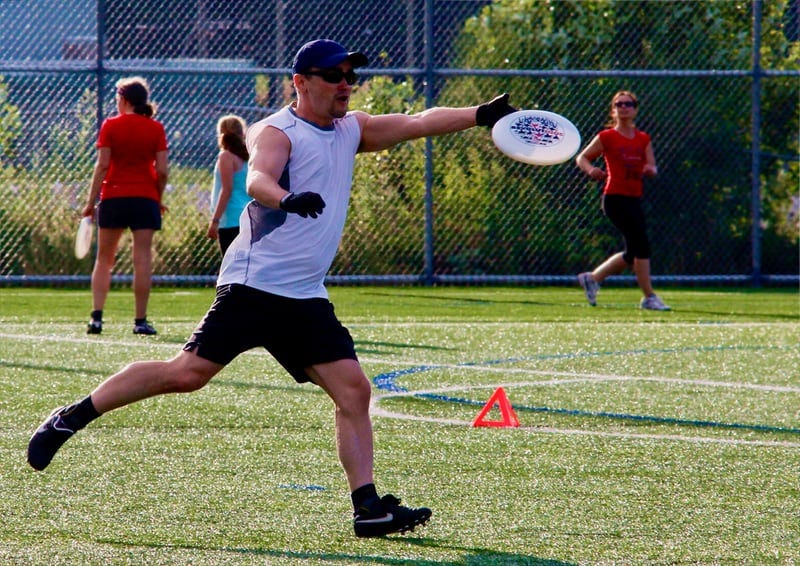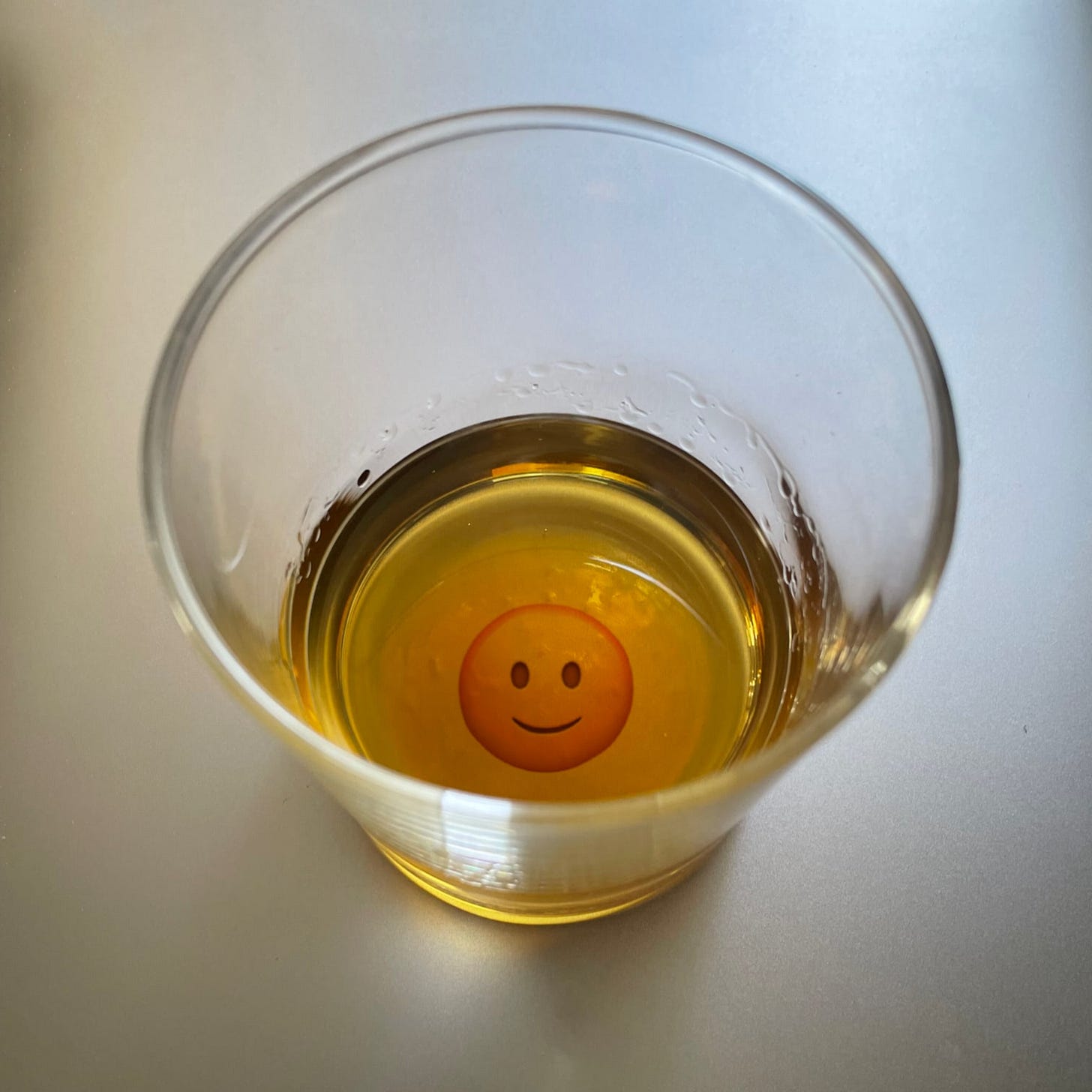Booze begone!
The most important thing for me to try is also the hardest
For seven years I have been partially blaming myself for making my mysteriously poor health even worse with two obviously self-destructive addictions:
1. Booze
2. Frisbee
Uh, frisbee? Yes, by which I mean the sport of ultimate. I recently retired from 25 years of playing, and whipped up a little memoir about my quarter century of “chasing plastic.” Ultimate involves intense, competitive athletic exertion — probably disastrously intense for me, but also a great source of pure joy, which made it extremely hard to quit.
I also find a surprising amount of happiness in a glass of whiskey. And that’s the problem with both of these habits: they are both double-edged swords, delivering clear short-term benefits of one kind, and delayed harm of another.
Every chronic illness has dilemmas like these. Hell, every life has them — they’re just more intense with chronic illness.
The booze backstory
I barely had a drink until I was thirty. I treated it like the poison it truly is. I was a holier-than-thou teetotaller. Well done, Nineties Me! I think?
And then the pendulum swung. When I finally started drinking in my fourth decade of this life, I did it like I had some catching up to do, and I soon learned that I was a cheerful drunk. It all just seemed pleasant and fun, never ugly or reckless.
Eventually it sank in that drinking doesn’t have to be a colourful disaster to be a problem. I started to come to my senses in my early forties. A friend I had been drinking with semi-regularly quit entirely, and I partially followed suit by reducing my consumption substantially. That was probably my last chance to quit relatively painlessly.
When I got sick in 2015, it wasn’t long before it occurred to me that the alcohol might be making a bad situation worse… but I realized that I could no longer easily leave the stuff alone. My modern habit is a very tightly controlled 1-2 drinks every night. Almost never more, but almost never less.
I know it’s an addiction because it’s compulsive. In the morning I am full of fiery virtue: It stops today. I won’t have a drink tonight. No way. Begone, demon! But when 5pm comes around, my morning self seems like a naive arsehole, I teeter on the edge of the abyss, and I jump.
Alcohol versus chronic illness
My habit formed because drinking is my only reliable source of relief. It is the best shitty medicine I have. Day in and day out, I grind through the tedious hours of pain, like I have the infinite flu aches (and more besides)… and I know I can get an hour or two of relief from a single drink, 90% of the time.
This is what alcohol is like for many people with chronic pain. It’s not that we think of it as a “pain killer,” not that exactly. It’s subtle but unambiguously different: it makes pain more endurable. It is less than a pain killer, but more than just a coping mechanism. The relief is genuine. I truly feel better while the buzz lasts.
Or maybe it is an actual pain-killer in my case! I have hypothesized that many of my symptoms are caused by painful muscle cramping, some more obviously than others, and I’ve seen numerous examples of such symptoms backing off while buzzed. Alcohol might be an effective muscle relaxant. So maybe it is directly therapeutic for what pains me.
(Yes, I have tried actual muscle relaxants, and studied them too. They are ineffective for me, and for most people. As with pain in general, treatment is probably confounded by a great variety of underlying causes.)
What’s the worry?
We’ve all seen in the headlines recently — alcohol is a carcinogen, even in low doses. It is a poison, and no amount is safe. From a cultural norms perspective, a drink or two per night barely registers as a bad habit. But medically? We know it’s bad news.
I am unquestionably stressing my system, adding to my default load of malaise and exercise intolerance. In my darkest moments, I even wonder if my drinking are actually partly how I have ruined myself. I never go so far as to think that it’s actually The Cause, but it might be a major contributor, part of a constellation of physiological stressors that wiped me out — and now continues to hold me down.
I have reduced or eliminated drinking for a few short periods. My best run was about six dry weeks dry in 2018 — but I hated every minute of it, and felt no better. But it also probably takes three times that long to fully recover from the effects.
Surely if I intend to “try everything” to help myself, quitting alcohol must be at the top of my list
When someone (usually myself) tells me that I should quit, all I can think is, But how the actual fuck will I survive the evenings? The dilemma is real and serious. The forces pulling in each direction are potent. Anyone who thinks it’s just a matter of will power needs to walk a mile in my shoes.
I just honestly don’t know if I have it in me. This isn’t a public declaration of my intent to quit: I’m just describing the dilemma.




In the email version of this post, there was a typo in the first sentence… I typo created about 20 seconds before sending it out, and noticed about 5 seconds after! Maddening!
Yes. Alcohol. At 70 my Dr. tells me my ultra sound shows signs of 'fatty liver disease.' My blood work shows pre-diabetic. My SI Joint is driving me nuts. My glaucoma checkup shows my eye pressure is lower than 6 months ago checkup. Sweet. At least one thing is going well. Alcohol is not my friend for any of these conditions. I now have enough things staring at a woman who is in otherwise good health. Oh, and I'm full time caregiving the husband. No stress there, nope.
I find my serious leg cramps that throw me out of bed will stop if I cut the wine out of my life. I amped up my calcium, etc, and that does help a lot. But, alcohol winds up causing more stress through the pains that it tends to feed. I have quit altogether a few times this year and each time I do feel better physically. Less pain, my stomach likes it, I sleep better...with what sleep I can get.
I do have a couple of tokes daily in the evening. Helps w the stress, the eyeball pressure, and my perspective on good well water is that it will be worth more than the best wine in the near future. Drink up. Enjoy the Soda Stream charged water as though it is champagne ;)